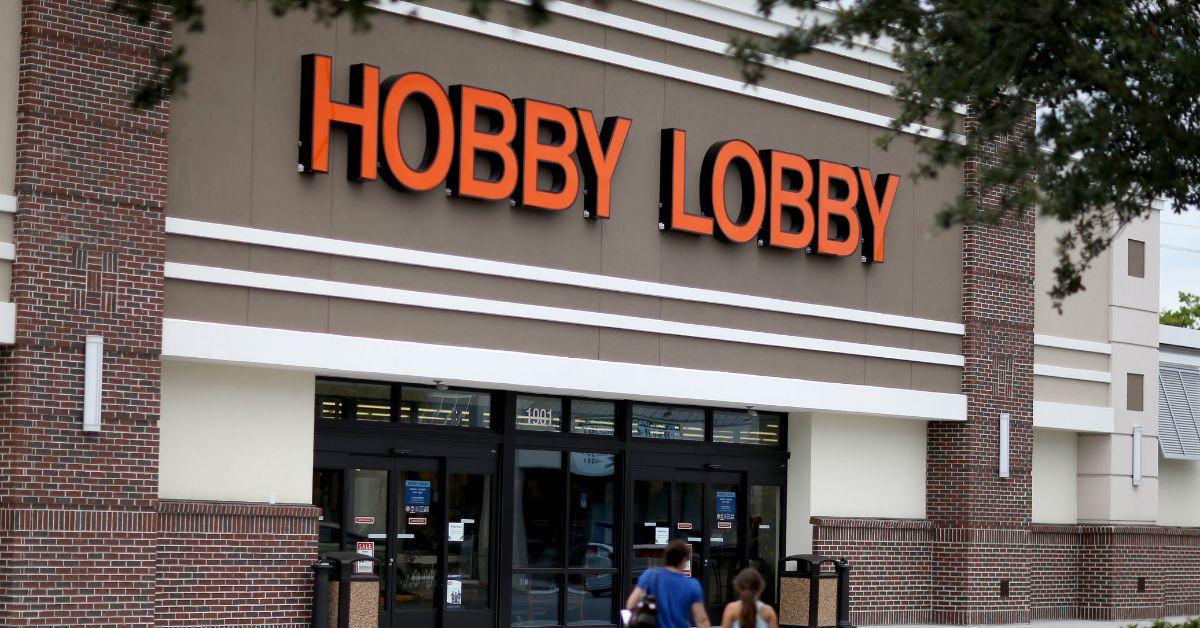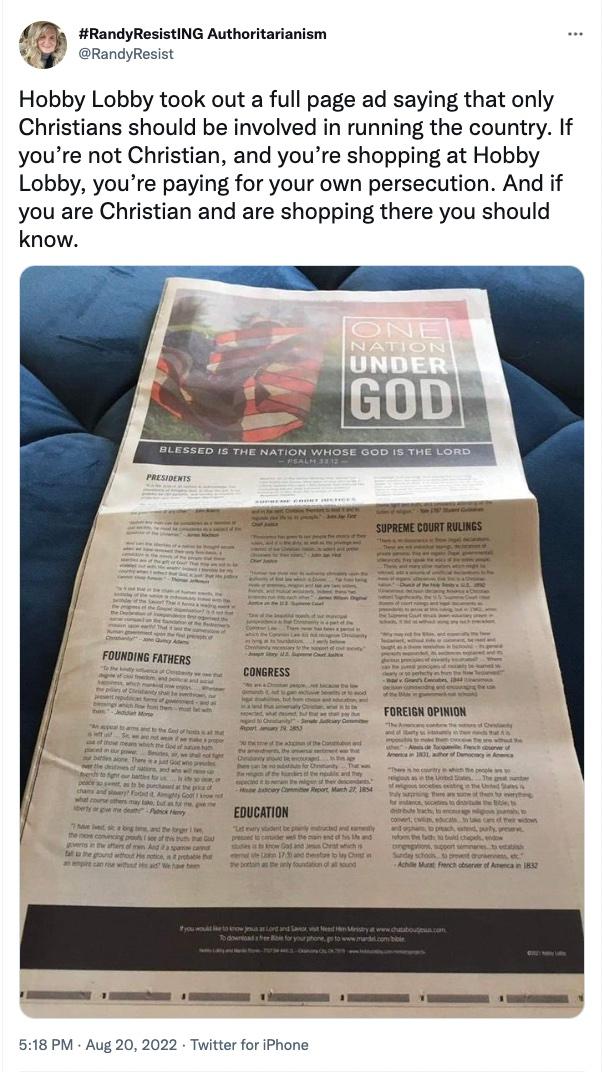Hobby Lobby becomes controversial for an entirely new reason
There was a point in which Hobby Lobby was just an arts-and-crafts retail chain. Those days, however, are long gone.
If Hobby Lobby Had a Hobby, It Would Be Stirring Up Controversy
Craft retailer Hobby Lobby is known for trying to pushing its religious beliefs onto customers. Here are three times Hobby Lobby was under fire.
Aug. 25 2022, Published 4:59 p.m. ET

“I would rather make crafts from stuff I find in a dumpster than shop at Hobby Lobby,” declared Twitter user @86Whitemoonlily. “Forever done with Hobby Lobby. I’ll drive the extra 5 miles to Michael’s. #BoycottHobbyLobby,” opined user @africanpride_00.
The platform was ablaze with hate for the American craft retailer in August 2022 after a photo of its full-page Independence Day ad, which ran in several newspapers across the U.S., went viral.
Tweeted by @RandyResist in late August, the ad was titled “One Nation Under God” and included the Bible verse “Blessed is the Nation whose God is the lord.”
It also shared quotes from our founding fathers that insinuated that the U.S. was built on the foundations of Christianity. But as the Freedom From Religion Foundation noted in 2018 when the company published a similar ad, Hobby Lobby often takes quotes out of context and misconstrues them for their own benefit.

Many users on Twitter expressed their disappointment in the retailer, as they believed its ad didn’t just promote Christianity, but it also indirectly tore down other religions.
U.S. Army veteran David Weissman responded to the ad on Twitter with the following: “Shame on you @HobbyLobby. As an American Jew who served in the United States Army and took an oath to defend the Constitution; I find your statement of America should be lead by Christians to be asinine and unconstitutional.”
But this isn’t the first time the company caused an uproar. In fact, this is actually one of Hobby Lobby’s less explosive actions. Keep scrolling as we discuss past controversies at Hobby Lobby.
Hobby Lobby illegally imported 5,500 ancient artifacts from Iraq for $1.6 million.
In 2010, Hobby Lobby purchased thousands of items during an auction from unnamed dealers based in the United Arab Emirates and Israel, per PBS.
However, the items that Hobby Lobby received were relics from Iraq that had been falsely labeled things like “ceramic tiles” or “clay tiles (sample)” in order to get through customs. Since 1990, there have been strict restrictions placed on importing goods from Iraq to the U.S., and this was illegal.
Eventually the U.S. Immigration and Customs Enforcement caught on, and in 2018, Hobby Lobby ended up paying a $3 million fine and was ordered to send all the artifacts back.
In a statement, Hobby Lobby owner and president David Green noted that “the company was new to the world of acquiring these items” and “should have exercised more oversight and carefully questioned how the acquisitions were handled,” hinting that the smuggling was a result of the company’s lack of experience at auctions.
However, many folks believed that the retailer participated in this fraud sale intentionally as Green had a penchant for biblical-era objects. Not to mention that he and his family own the Museum of the Bible, which could have easily housed these artifacts. Some folks have hypothesized that the unnamed dealer that Green bought the items from was ISIS.
Green has denied claims that the artifacts were intended for his museum. It’s unknown if he was actively aware of what was really going on in this transaction.
Hobby Lobby refused to cover birth control for its employees and won the case in court.
Hobby Lobby also made headlines when it rejected to cover employees’ birth control due to David Green’s religious beliefs. In 2014, the arts-and-crafts retailer brought the case to court, where it was heard by the Supreme Court.
In Burwell v. Hobby Lobby Stores, the Court ruled against birth control access in a 5-to-4 decision, with the majority of the justices agreeing that Hobby Lobby and other “closely held corporations” could deny birth control coverage to their employees.
Hobby Lobby becomes controversial for an entirely new reason
Hobby Lobby’s owners have become known for collecting rare artifacts for a new museum dedicated to the Bible. We didn’t know how they obtained those artifacts.

There was a point in which Hobby Lobby was just an arts-and-crafts retail chain. Those days, however, are long gone.
Hobby Lobby, owned by Christian conservative Steve Green, rose to political and legal prominence when the company argued that its corporate spirituality entitles Hobby Lobby to deny contraception coverage to its employees. Green also made headlines for creating a Bible curriculum to be used in public schools.
But Hobby Lobby’s owners have also become known for collecting rare artifacts for a new museum dedicated to the Bible, which is scheduled to open later this year just a couple of blocks from the National Mall in Washington, D.C. What we didn’t know is how Green and his family obtained those artifacts.
The arts-and-crafts chain Hobby Lobby will pay $3 million to settle a federal case over smuggled Iraqi antiquities it bought to demonstrate its “passion for the Bible.”The Oklahoma-based retailer also agreed to forfeit thousands of clay artifacts it bought in 2010 — an acquisition that prosecutors said was “fraught with red flags” the company didn’t heed.
Green acknowledged “regrettable mistakes” in a written statement.
NBC News’ report noted that Hobby Lobby hired an expert who warned that the artifacts may have been looted “and counseled them to make sure the country of origin was properly labeled on customs forms.” Instead, according to the Justice Department, “the 5,500 artifacts were shipped without proper documentation.”
The report added, “The company didn’t pay the dealer who supposedly owned the items, instead wiring $1.6 million in payment to the accounts of seven other individuals.”
The Justice Department’s statement, released late yesterday, is available here. Hobby Lobby’s Museum of the Bible is still apparently scheduled to open its doors in November.
]]>